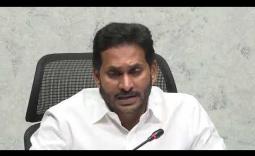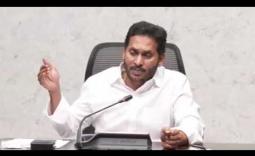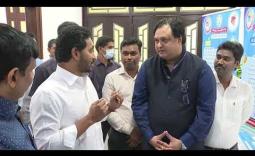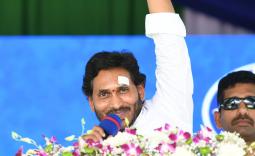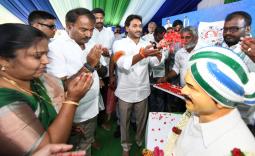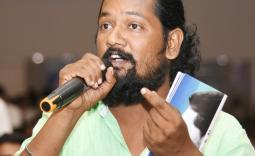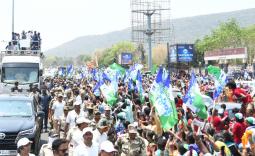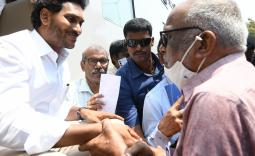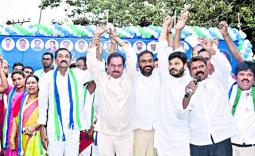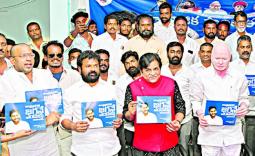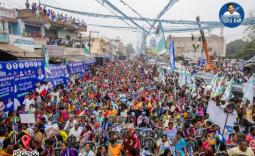YS Jagan Mohan Reddy expressed grief over the demise of Sri Shanti Swaroop A Peep Into CM Jagan’s Heart Of Gold!
A Peep Into CM Jagan’s Heart Of Gold! YS Jagan Mohan Reddy expressed delight over Bharat Ratna awards
YS Jagan Mohan Reddy expressed delight over Bharat Ratna awards AP Leads From the Forefront Disbursing Over Rs 4 Lakh Crore to the Poor via DBT
AP Leads From the Forefront Disbursing Over Rs 4 Lakh Crore to the Poor via DBT YSRCP's Impactful Welfare Measures
YSRCP's Impactful Welfare Measures YSRCP Highlights Plight of Dalits During Naidu's Rule
YSRCP Highlights Plight of Dalits During Naidu's Rule TDP, a BC Leader Factory, Yet No Representation in Rajya Sabha – Why?
TDP, a BC Leader Factory, Yet No Representation in Rajya Sabha – Why? Invested Rs 1,600 crore dedicatedly for the development of Kodur
Invested Rs 1,600 crore dedicatedly for the development of Kodur ‘Real development is providing quality education to poor and investing in human capital,’
‘Real development is providing quality education to poor and investing in human capital,’ Samajika Sadhikara bus yatra in Araku Valley, Anantapur
Samajika Sadhikara bus yatra in Araku Valley, Anantapur
YSRCP submits memorandum to 14th FC
14 Sep 2014 12:33 PM
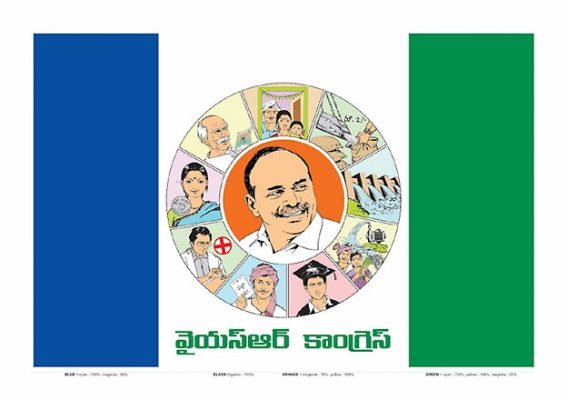
D A Somayajulu
Member,
Political Affairs Committee
& Dt:
12th September 2014
P V Mithun Reddy
Member of Parliament
Memorandum to Fourteenth Finance Commission
Hon’ble Chairman and
Hon’ble Members of Fourteenth Finance Commission
Kindly
recall that at the All Party Meeting held by the Hon’ble Fourteenth Finance
Commission at Jubilee Hall, Hyderabad on 13th September 2013, apart
from making oral presentation, we also submitted a 13 page Memorandum. We write to confirm that we reiterate our
stand submitted in the written submissions made by us on 13th
September 2013.
The
main requests we made in the above referred Memorandum are:
1.
“The Union Government may kindly consider
dispensing with a large number of CSS programs and instead make higher revenue
devolution to the States and allow them to make their own choices for spending
money on the welfare of the people and development programs. It is strongly
urged that the Fourteenth Finance Commission should consider adding cesses and
surcharges and non-tax revenues of Central Government to the present divisible
taxes and of that atleast at 50% should be shared by the Union Government with
states.;
2.
“We request the Commission to reduce the
Fiscal Capacity Distance weightage from 47.5% to 20% and the balance 27.5% has
to be transferred to parameters like population, area, plan expenditure in
proportion to total expenditure and for social sector spending. Special
weightage should also be given to states
which are contributing to National Food Security by offering power subsidies
from their budgets. We also request that population should be reckoned as at
1971 base. We further request that the criteria for fiscal deficit should be
changed. It should not be linked to GSDP; instead the eligibility for borrowing
shall be on the basis of states own revenues. States with better revenue
buoyancy should be given permission to borrow more for stepping up public
expenditure. After all, loans are repaid out of the revenues of the State and
not out of GSDP.
We request the
following weights for devolution of Central Revenues:
Criteria and Weights for Tax
Devolution
Criteria Weight
1.
Population (1971) 30%
2.
Area 15%
3.
Fiscal Capacity Distance 20%
4.
Plan Expenditure proportion to total
expenditure & Social Sector expenditure 25%
5.
States contributing foodgrains
for
national security 5%
6.
Administrative Reforms etc 5%”
We
request you kindly to agree to the aforesaid requests. In addition, we have one
more request. The States bordering the Bay of Bengal have been facing one
cyclone after the other almost once every year and in some years more than once
causing in their trail heavy loss of life, property, standing crops, cattle,
poultry birds etc. There must be a separate fund exclusively for the maritime states
bordering Bay of Bengal for meeting not only immediate relief but also for
rehabilitation etc. As things stand today, despite many state and central schemes
under operation, people are by and large have been fending for themselves. Many
a times, the rehabilitation has not been reaching even 10% of the affected
families. Therefore, there is a strong
case for additional grants to be made to these maritime states.
RESIDUARY STATE OF ANDHRA PRADESH
Between
the last meeting in September 2013 and now, many changes have occurred. The
State has been divided and two new states have come into existence from 2nd
June 2014 by virtue of AP Reorganization Act 2014. While we continue to plead
for the above weights for devolution of funds, in view of the unjust division
of the State, leaving the economic power house viz, the Hyderabad Metropolitan Development Area wholly to
Telangana State, the residuary State of Andhra Pradesh is expected to begin
with revenue deficit which has become alien to united AP during the last 8
years, when the State enjoyed great economic prosperity and revenue surpluses,
particularly during 2004-014.
For
reasons best known to them, the successive Chief Ministers of Andhra Pradesh
since 1956 promoted all the Central Public Sector Units that were meant for
entire state of AP in and around Hyderabad compelling the entire
ancillarization also to take place in and around Hyderabad only. It may please
be recalled that the Government of India used the public sector as the main
vehicle of economic growth with the private sector playing only a second fiddle
till the onset of economic reforms initiated in 1991.
All
the Civil & Defence research laboratories meant for entire AP were also
located in and around Hyderabad. All institutions of higher learning and all
advanced institutions of health care also got located in and around Hyderabad. Even
the IT industry was promoted in and around Hyderabad city. The Capital is in
Hyderabad. The High Court is in Hyderabad. The entire economic activity is in
Hyderabad. The entire private sector also came to Hyderabad. Naturally, the
spending ability is also concentrated in and around Hyderabad. Therefore,
revenues, particularly the VAT, which bears direct proportionality to spending,
have also been higher in and around Hyderabad.
The loss
of Hyderabad, therefore, means loss of hope for the people of Seemandhra as
they will be deprived of (a) the engine of economic growth (b) proportional
revenues (c) employment opportunities and (d) social, educational and health
care infrastructure.
Our
party has presented the problems arising out of division to Prime Minister,
President, the then Hon’ble Speaker by way of Petition. We could not stop the
division, given our strength in Lok Sabha and Rajya Sabha.
Dr
Manmohan Singh, the then Prime Minister of India, recognizing that the
residuary State would indeed suffer because of the division, gave the following
assurances.
1.
“Special Category Status will be extended to
the successor state of Andhra Pradesh comprising 13 districts, including the
four districts of Rayalaseema and the three districts of north coastal Andhra
for a period of five years. This will put the state's finances on a firmer
footing.
2.
The resource gap that may arise in the successor
state of Andhra Pradesh in the very first year, especially during the period
between the appointed day and the acceptance of the 14th Finance Commission
recommendations by the Government of India, will be compensated in the Regular
Union Budget for 2014-15.
3.
The Bill already provides for a special development
package for the backward regions of the successor state of Andhra Pradesh, in
particular for the districts of Rayalaseema and North Coastal Andhra Pradesh.
This development package will be on the lines of the K-B-K
(Koraput-Bolangir-Kalahandi) Special Plan in Odisha and the Bundelkhand special
package in Madhya Pradesh and Uttar Pradesh.”
The BJP which was in the
opposition at the time of the passage of AP Reorganization Bill, not only
supported the aforesaid assurances given by the then Prime Minister, but also
went further to assure the people of residuary state that the special category status will be given
for a period of 10 years.
Inspite
of these assurances, so far we did not hear anything about implementing Prime
Minister’s assurances, particularly as regards the Special Category Status. This needs to be addressed urgently.
Similarly, we are not aware of how much of the resources gap will be funded by
the Central Government.
Besides, Section 46
(1) of the AP Reorganisation Act 2014 states as follows:
46. (1) The award made by
the Thirteenth Finance Commission to the existing State of Andhra Pradesh shall
be apportioned between the successor States by the Central Government on the
basis of population ratio and other parameters:
Provided that on the appointed day, the President shall make a reference
to the Fourteenth Finance Commission to take into account the resources
available to the successor States and make separate awards for each of the
successor States.
Section 94
(1) and (2) of the AP Reorganisation Act 2014 provide:
94. (1) The
Central Government shall take appropriate fiscal measures, including offer of
tax incentives, to the successor States, to promote industrialisation and
economic growth in both the States.
(2) The
Central Government shall support the programmes for the development of backward
areas in the successor States, including expansion of physical and social
infrastructure.
Despite the aforesaid assurances in the act, the
Central Government has not so far announced the industrial incentive package
and the package for development of backward areas.
As far as
Capital City construction is concerned, the following assurances in Sections 94
(3) and (4) are given in the AP Reorganization Act. They are reproduced below:
(3) The
Central Government shall provide special financial support for the creation of
essential facilities in the new capital of the successor State of Andhra
Pradesh including the Raj Bhawan, High Court, Government Secretariat,
Legislative Assembly, Legislative Council, and such other essential
infrastructure.
(4) The
Central Government shall facilitate the creation of a new capital for the
successor State of Andhra Pradesh, if considered necessary, by de-notifying
degraded forest land.
In the light of the above, it becomes the
responsibility of the Central Government to provide funds not only for meeting
the revenue deficit of the residuary state till it is able to improve its
revenues to match its expenditure but also for building new capital and other
infrastructure. The Union Government should also ensure that all the promises
made in the 13th Schedule to the AP Reorganization Act 2014 along
with the assurance relating to implementation of Polavaram Project as a
National Project are honoured fully.
The
Hon’ble Finance Minister of AP while presenting Annual Budget 2014-15 for the
residuary State of AP on 20th June 2014, in his budget speech stated
that
‘There is a huge impact of State
bifurcation on State Finances. Since the debt, employees, pensioners are
allocated based on population ratio, the Expenditure naturally will be more
than 58% of the united State.
However, when it comes to revenue sales
tax, which is the most important source of revenue for the State is expected to
be only around 47% of the combined State’s revenue and revenue under stamp duty
and Registration fees, motor vehicle tax are expected to be less than 50%.
Excise is the only tax where the share of
residuary State will be close to 55%. Non‐tax revenue from mining will be less
than 30% of the united State. Overall revenue share of residuary State from tax
and non‐tax is estimated to be around 47% of the united State.’
Going
by the above, it is to be understood that as Hyderabad city has become integral
part of Telangana state, the revenues of the residuary state will only be 47%
of the revenues of United AP as against the population percentage of 58%. The
expenditure of the residuary state will however be in proportion to its
population percentage of the united AP. A correct estimate of the revenues of
the residuary state will be known only after six months, by which time the
trend of actual revenue receipts will be known. Apparently, there appears to be
too much confusion about various figures provided in the recent budget for
2014-15, which is evident from para 172 of the Budget Speech of Sri Yanamala
Ramakrishnudu. The same is reproduced below.
“For the financial year 2014‐15, Government proposes an expenditure
of Rs.1,11,824 crores; Non‐plan
expenditure is estimated at Rs.85,151 crores and Plan expenditure at Rs.26,673
crores. The estimated revenue deficit is Rs.6,064 crores and Fiscal Deficit is
estimated at Rs.12,064 crores. The fiscal deficit works out to 2.30% of GSDP
whereas the Revenue Deficit works out to 1.16%. These estimates include the
receipts and expenditure of two months relating to undivided State of Andhra
Pradesh and the anticipated additional assistance of
Rs. 14,500 Crores from Government of India in the context of State
reorganization. If these are excluded, the Revenue Deficit of the residuary State
of Andhra Pradesh will be Rs.25,574 Crores and the Fiscal Deficit will be
Rs.37,910 Crores as per Vote on Account and as indicated in the White paper on
State Finances. In terms of percentage to GSDP, they work out to be 4.84% and
7.18% respectively.”
The
White Paper on State Finances estimated a revenue deficit of Rs 15,600 crores
for the ten months period of the current year. The Budget documents estimate a
revenue deficit of Rs 6,020 crores while the Budget Speech says that the
revenue deficit could go upto Rs 25,574 crores
On
an average, during the last 10 years, the plan
expenditure as percentage of total expenditure of United Andhra Pradesh
was hovering between 33-35%. Consequently, the non-plan expenditure was around 65% of the total
expenditure. Similarly, the capital expenditure as percentage of total
expenditure was around 12%. Unfortunately, in the Budget for 2014-15, the plan expenditure has been
budgeted at 23% of the total expenditure and consequently the non plan
expenditure has gone upto untenable levels of 77% of the total expenditure.
Even more dangerous trend has been the substantial reduction of the share of capital
expenditure from 12% to 6% of the total expenditure in the current budget.
For reasons
best known to the Government, the non-plan expenditure has been budgeted beyond
all proportions. As per the pre-actuals for the united State of Andhra Pradesh,
the non plan expenditure for 2013-14 was Rs.94,318 crores. The CAGR for non
plan expenditure during the last five years was approximately 15% and applying
this, the non-plan expenditure for united AP for 2014-15 would be around Rs. 1,08,465
crores. Even accepting the version of the Hon’ble Finance Minister of AP, the
non-plan expenditure of the residuary state cannot go beyond 58% of the non-plan
expenditure of united AP. At 58% which
is the population share of residuary state, the non plan expenditure for
2014-15 for residuary state should be around Rs. 62,909 crores. As against
this, the Government budgeted Rs. 85,151 crores, which is higher by more than
Rs. 23,000 crores.
This
is completely inexplicable given the fact that the Government has provided only
Rs. 1000 crore towards loan waiver as against the promise of Rs. 1,02,000
crores. None of the other poll promises such as unemployment allowance of Rs
2000 per month per unemployed person
has been included in the non-plan expenditure budgeted. We would have been
happy had the non-plan expenditure gone up because of the provisions made for
honoring poll promises. But, that is not the case. How then did the Non-Plan
expenditure go up so steeply?
The residuary state needs to give push
to the economic growth of the state from the current growth rate of 6%. It is universally
acknowledged that higher the GDP growth rate leads to higher revenues. During
1999-2004, the Plan Expenditure grew only at 11.82% per annum compounding and
as a result, the GSDP growth rate was as low as 5.92% for the five year period
1999-2004. As against that, Andhra
Pradesh achieved high growth rate of 9.6% per annum compounding for the five
year period 2004-09 because the Plan Expenditure for those five years grew
annually at 21% compounding. Higher Plan outlays and higher Capital Expenditure
will give big push to GSDP growth rate.
The need of the hour, therefore, is to
step up expenditure on building good Capital City and other infrastructure.
Increasing the Non-Plan expenditure by reducing the allocations on Plan
expenditure and Capital Expenditure will have serious long term repercussions
on the GSDP growth rate of the state and consequently state’s own revenues will
also be adversely affected.
To sum up,
1.
We
request the 14th Finance Commission to increase the Central
Transfers to states to 50% and kindly apply the following weights for
devolution to various states:
Criteria
and Weights for Tax
Devolution
Criteria Weights
1.
Population (1971) 30%
2. Area 15%
3. Fiscal
Capacity Distance 20%
4. Plan
Expenditure proportion to total
expenditure & Social Sector expenditure 25%
5. States
contributing foodgrains
for national security 5%
6. Administrative
Reforms etc 5%
2. We further request that all the
assurances given in AP Reorganisation Act 2014 together with those given by the then Prime Minister, Dr
Manmohan Singh for the development of the residuary state of Andhra Pradesh are
fully honored.
3. The Finance Commission is requested
to make correct estimate of the revenue deficit not only for the current year
but also for future years and make special allocations to the State in view of
extraordinary circumstances.
4. The State Government appears to have
submitted detailed Memorandum seeking additional funds for the new state. We
support the efforts of the State Government to mobilize additional funds for
building new capital, educational & health care institutions and industrial
and IT infrastructure.




